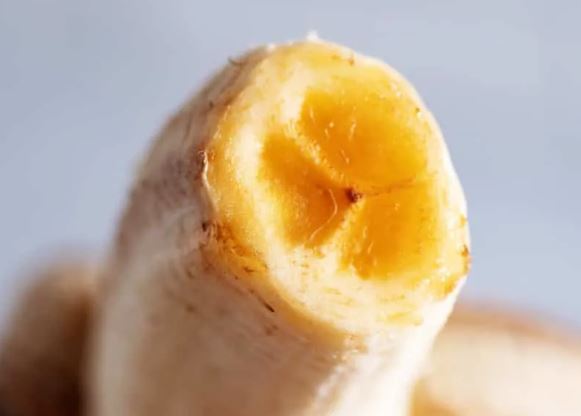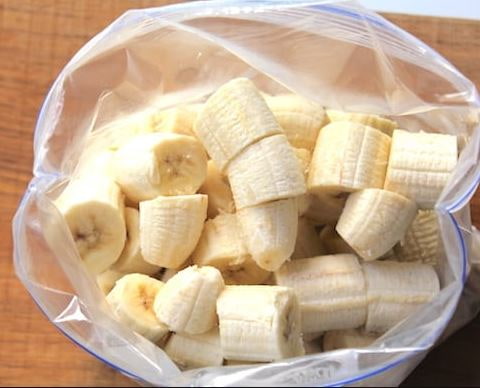Ripe bananas start losing their white color and turning brown within minutes of getting peeled and cut into slices. This discoloration happens when the flesh of the banana comes into contact with oxygen and enzymatic browning results. Enzymatic browning is an oxidation reaction. Understanding what causes this reaction helps you maintain the whiteness of your sliced bananas until they are eaten.
To keep sliced bananas from turning brown, squeeze some lemon juice on them to slow the production of enzymes that cause browning. If you are using them in a salad, mix them with high-acid fruits like pineapple as the juice helps to slow the browning process.
Why Do Bananas Turn Brown After Peeling?

A banana contains high levels of polyphenol oxidase and other chemicals that contain iron. When peeled, iron oxidizes in the air and turns the color of the banana from white to brown. The reaction is similar to the brown coating of rust which happens when you expose an iron nail to the air.
Therefore, the best way to present a fresh banana salad is by slicing and adding the banana as the last fruit just minutes before serving. That way you save it from staying in contact with oxygen for a long time hence preventing browning.
How to Prevent Sliced Bananas from Turning Brown

To prevent your bananas from turning brown faster after you slice them, there are five things you can do:
- Slow the production of enzymes that cause browning. Put a spoonful of lemon juice to a cupful of water, you can use more juice if you have more bananas to slice. Peel the bananas and slice them. Drop the banana slices inside the diluted lemon juice and allow them to rest there for a few minutes. Remove the slices or strain the lemon water, this will leave you with well-treated bananas that will not turn brown
Pro Tip: if you do not have lemon juice when slicing your banana, you can use the juice of any other citrus fruit in the house. Apple Cider also helps achieve the same enzyme inhibiting effect.
2. Reduce the exposure of the cut banana slices to oxygen. This is as simple as keeping the slices in an airtight container. However, if you need the bananas as a snack, you do not have to slice them and then keep them in airtight containers.
It would be best to leave the peels on as they are the best natural way to keep oxygen away from the fruit until you are ready to use it.
If you have to slice the fruit for recipes, consider putting it in a zip lock bag or in a sealed container that keeps the air out.

3. Lower the temperature of the banana slices to reduce the speed at which the oxidation reaction happens.
Here, you drop the banana slices in a bowl of cold water and put them inside the refrigerator. When the temperature of the water drops, it becomes hard for the oxygen in the water to react with the bananas and cause oxidation.
4. If your banana slices are already in a fruit salad, take a full lemon and cut it in half. Squeeze all the juice from the lemon and pour it all over the salad.
Mix it well to ensure that all banana slices get a bit of lemon juice. This will slow down the browning of the white banana slices.
5. Use the anti-browning powders sold in grocery stores and supermarkets. The powders contain dry crystals of citric acid, and when you add these crystals to water, you get the acid you need to use as an anti-browning solution.
Pro Tip: If you have vitamin C tablets in the house, and you do not have any other anti-browning solution, you can crush them and add water to them to prevent your banana slices from turning brown.
See also: How to stop pears from browning
How Long Does it Take for Sliced Bananas to Turn Brown?
Banana slices will start discoloring within a few minutes when left in the open and not treated in any way. The process is even faster when the room is warm like in the summer.
If you have dipped the slices in lemon juice or other acidic solution, the slices will take time before they start turning brown.
How To stop Bananas from Turning Brown
If the banana has its peel still on, it will start turning brown three to five days after ripening especially if they are still in a bunch.
Browning of an unpeeled banana happens because once the fruit has ripened, the production of ethylene does not stop. The excess ethylene keeps oxidizing the fruit, making it mushy, and discoloring the peels, turning them brown. Although you can not stop the production of ethylene on unpeeled bananas, you can possibly save your bananas from over-ripening and turning brown all at once.
Once your bunch of bananas start ripening, separate them and cover their stems separately with a plastic paper. This prevents the production of ethylene gas from fully ripe bananas, hence allowing each banana to ripen at its own pace.
You can also put your ripe banana bunch in the refrigerator for 2-3 days. The low temperatures in the fridge slow the ripening process from the inside hence protecting the banana from getting mushy. However, it causes the peel to darken faster compared to at room temperature.
How to Store Bananas to Keep Them Fresh?
To keep bananas fresh, you need to reduce the amount of oxygen they come into contact with, inhibit the production of the ripening gas and reduce the temperature.
- If you have already sliced the bananas for a snack or other use later in the day, put them in a zip lock bag to keep air out.
- If they are in a salad, add diluted lemon juice and keep refrigerated
- If they are not peeled avoid keeping them frozen as this will make the skin turn black. Instead, store them in a cool and dry part of the kitchen.
Keeping your bananas fresh is a simple task that you can accomplish as long as you know the right hacks. Fresh-looking bananas make your salad look fresh and healthy, and therefore, more appetizing.
